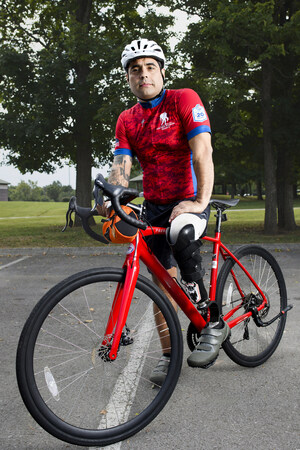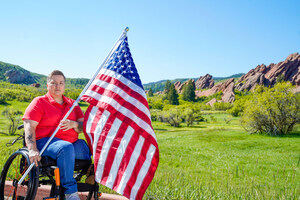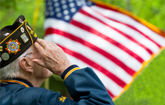
Wounded Warriors Take Over Dead Horse Point State Park
Mental Health Support Uses Outdoor Therapeutic Recreation
MOAB, Utah, Nov. 17, 2016 /PRNewswire-USNewswire/ -- Wounded Warrior Project® (WWP) teamed up with Telluride Adaptive Sports Program (TASP), Poison Spider™ Bicycles, and Cliffs and Canyons to provide a unique recreational experience for an all-male multi-day mental health workshop at Dead Horse Point State Park in Moab, Utah.
TASP is a nonprofit organization dedicated to enriching the lives of people with disabilities by providing educational and recreational opportunities that develop life skills, encourage personal growth, and promote independence. The TASP mission blends well with WWP's mission to honor and empower Wounded Warriors. Together the two organizations were able to work with Poison Spider Bicycles to secure high-quality mountain bikes and Cliffs and Canyons to ensure a safe, anxiety-provoking canyoneering experience, allowing wounded warriors opportunities for personal growth and resilience.
"There are no limits to what our warriors can achieve in their recoveries. When given the opportunity and the right tools, our resourceful warriors can reach their goals," said Mike Linnington, WWP chief executive officer.
To date, an estimated 400,000 service members live with invisible wounds of war, including combat stress, depression, and – the signature wounds of Operation Enduring Freedom (OEF) and Operation Iraqi Freedom (OIF) – post-traumatic stress disorder (PTSD) and traumatic brain injury (TBI). Veterans managing these injuries are often forced to endure recalling prompts, typically referred to as triggers, which are linked to situational or emotional experiences and memories from the combat zone. The sound of popcorn popping or fireworks exploding can induce the memory of an improvised explosive device (IED) attack, or a random feeling of anger, sadness, or anxiety can recreate an emotional combat experience.
"A lot of my struggles haven't only been trying to move forward, but also learning a new normal that includes coping with post-traumatic stress disorder and traumatic brain injury," said Rob Scoggins, U.S. Air Force wounded warrior. "Despite constant daily, hourly, and minute-by-minute efforts, it's been difficult for me to find my way."
To address the growing mental health needs of warriors returning from war, WWP created its Combat Stress Recovery Program (CSRP). Through the generous support of donors, CSRP is able to offer veterans a range of specialized programs and services – all tailored to each veteran's specific needs – free of charge. WWP and its supporters believe warriors already paid their dues on the battlefield, so warriors don't pay for any service they receive.
"I was pushed way outside of my comfort zone during the mental health workshop week," Rob said. "That pressure allowed me to move forward in my recovery even once I got back home. I completed my application to an online music college, and I've been looking into visiting actual establishments – something I've tried before, failed miserably at, and vowed never to do again."
Connections create a vital support system in a warrior's recovery. Rob recently finished his application to the Art Institute in Denver for a Bachelor of Arts degree in media production. He continues to work himself into his community.
WWP connects warriors, their families, and caregivers to peers, programs, and communities to ensure they have a readily available network of support.
"This event enabled me to see there truly were others thinking, feeling, and doing things I have," said Benjamin Walters, U.S. Army wounded warrior. "This is important in the healing process because you begin to see you're not 'crazy' and that what you're thinking, feeling, and experiencing is normal. This mental health workshop provided the opportunity to meet fellow veterans that were all in different places on their journey to recovery, either having gone through a particular stage, about to, or even coaching others with their experiences. This often brought out genuine encouragement from one brother to another. Where feelings had previously felt numb at best, they began to feel for these guys and consider them brothers. This is crucial in a society that doesn't seem to value the 'tribal' system, which we veterans function within so well."
WWP serves warriors through mental health services, physical health and wellness programs, career and benefits counseling, support services, and resources are free of charge to those WWP serves thanks to generous donors. Warriors are empowered to live life on their own terms, mentor fellow veterans and service members, and embody the WWP logo by carrying one another along a path toward recovery.
"WWP experiences truly build off one another and allow things to occur naturally, unforced," Benjamin said. "Being with the guys, outdoors enjoying fellowship, great food, challenges, and fun activities made for an unforgettable time. One thing you can count on for any mental health workshop is the ability to get outside your comfort zone, which enables you to build the mental fortitude and to remember, you can do this!"
About Wounded Warrior Project
We Connect, Serve, and Empower
The mission of Wounded Warrior Project® (WWP) is to honor and empower Wounded Warriors. WWP connects wounded warriors and their families to valuable resources and one another, serves them through a variety of free programs and services, and empowers them to live life on their own terms. WWP is a national, nonpartisan organization headquartered in Jacksonville, Florida. To get involved and learn more, visit woundedwarriorproject.org.
Photo - http://photos.prnewswire.com/prnh/20161116/440253
SOURCE Wounded Warrior Project







Share this article